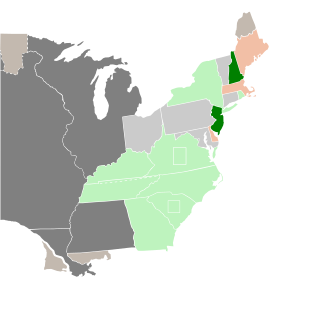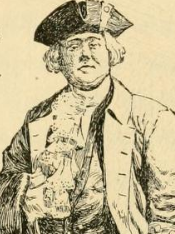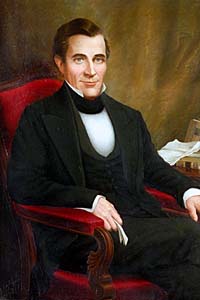| |||||||||||||||||
| |||||||||||||||||
| |||||||||||||||||
The 1803 Georgia gubernatorial election was held on 24 November 1803 in order to elect the Governor of Georgia. Incumbent Democratic-Republican Governor John Milledge won re-election against Solomon Wood in a Georgia General Assembly vote. [1]
| |||||||||||||||||
| |||||||||||||||||
| |||||||||||||||||
| Elections in Georgia |
|---|
 |
The 1803 Georgia gubernatorial election was held on 24 November 1803 in order to elect the Governor of Georgia. Incumbent Democratic-Republican Governor John Milledge won re-election against Solomon Wood in a Georgia General Assembly vote. [1]
On election day, 24 November 1803, incumbent Democratic-Republican Governor John Milledge won re-election against his opponent Solomon Wood. Milledge was sworn in for his first full term on 25 November 1803. [2]
| Party | Candidate | Votes | % | |
|---|---|---|---|---|
| Democratic-Republican | John Milledge (incumbent) | 65 | 91.55 | |
| Solomon Wood | 6 | 8.45 | ||
| Total votes | 71 | 100.00 | ||
| Democratic-Republican hold | ||||

United States gubernatorial elections were held on November 2, 2004, in 11 states and two territories. There was no net gain in seats for either party, as Democrats picked up an open seat in Montana while defeating incumbent Craig Benson in New Hampshire, while Republicans defeated incumbent Joe Kernan in Indiana and won Missouri after Bob Holden lost in the primary. These elections coincided with the presidential election.

United States gubernatorial elections were held on November 5, 2002, in 36 states and two territories. The Republicans won eight seats previously held by the Democrats, as well as the seat previously held by Minnesota governor Jesse Ventura, who was elected on the Reform Party ticket but had since renounced his party affiliation. The Democrats won 10 seats previously held by the Republicans, as well as the seat previously held by Maine governor Angus King, an independent. The elections were held concurrently with the other United States elections of 2002.

The 1804–05 United States Senate elections were held on various dates in various states. As these U.S. Senate elections were prior to the ratification of the Seventeenth Amendment in 1913, senators were chosen by state legislatures. Senators were elected over a wide range of time throughout 1804 and 1805, and a seat may have been filled months late or remained vacant due to legislative deadlock. In these elections, terms were up for the senators in Class 2.

The 1806–07 United States Senate elections were held on various dates in various states. As these U.S. Senate elections were prior to the ratification of the Seventeenth Amendment in 1913, senators were chosen by state legislatures. Senators were elected over a wide range of time throughout 1806 and 1807, and a seat may have been filled months late or remained vacant due to legislative deadlock. In these elections, terms were up for the senators in Class 3.

The 1802–03 United States Senate elections were held on various dates in various states. As these U.S. Senate elections were prior to the ratification of the Seventeenth Amendment in 1913, senators were chosen by state legislatures. Senators were elected over a wide range of time throughout 1802 and 1803, and a seat may have been filled months late or remained vacant due to legislative deadlock. In these elections, terms were up for the senators in Class 1.

United States gubernatorial elections were held on November 8, 2022, in 36 states and three territories. As most governors serve four-year terms, the last regular gubernatorial elections for all but two of the seats took place in the 2018 U.S. gubernatorial elections. The gubernatorial elections took place concurrently with several other federal, state, and local elections, as part of the 2022 midterm elections.

The 1803 New Hampshire gubernatorial election took place on March 8, 1803. Incumbent Federalist Governor John Taylor Gilman won re-election to a tenth term, defeating Democratic-Republican candidate, former Governor and United States Senator John Langdon in a re-match of the previous year's election.

The 1809 Connecticut gubernatorial election took place on April 10, 1809.

The 1803 Virginia gubernatorial election was held on 30 November 1803 in order to elect the Governor of Virginia. Incumbent Democratic-Republican Governor of Virginia John Page won re-election in the Virginia General Assembly as he ran unopposed.

The 1797 Virginia gubernatorial election was held on 30 November 1797 in order to elect the Governor of Virginia. Incumbent Federalist Governor of Virginia James Wood defeated incumbent Democratic-Republican member of the U.S. House of Representatives from Virginia's 12th district John Page in a Virginia General Assembly vote.

The 1793 Georgia gubernatorial election was held on 6 November 1793 in order to elect the Governor of Georgia. Democratic-Republican candidate and former Governor George Mathews defeated incumbent Democratic-Republican Governor Edward Telfair and fellow Democratic-Republican candidate Jared Irwin in a Georgia General Assembly vote.

The 1799 Georgia gubernatorial election was held on 8 November 1799 in order to elect the Governor of Georgia. Incumbent Democratic-Republican Governor James Jackson won re-election in a Georgia General Assembly vote as he ran unopposed.

The 1802 Georgia gubernatorial special election was held on 3 November 1802 in order to elect the Governor of Georgia following the resignation of Governor Josiah Tattnall due to declining health. Democratic-Republican candidate and former member of the U.S. House of Representatives from Georgia's at-large congressional district John Milledge defeated Federalist candidate and candidate for Governor in 1801 Thomas P. Carnes in a Georgia General Assembly vote.

The 1805 Georgia gubernatorial election was held on 4 November 1805 in order to elect the Governor of Georgia. Incumbent Democratic-Republican Governor John Milledge won re-election in a Georgia General Assembly vote as he ran unopposed.

The 1807 Georgia gubernatorial election was held on 10 November 1807 in order to elect the Governor of Georgia. Incumbent Democratic-Republican Governor Jared Irwin defeated Federalist candidate and former member of the U.S. House of Representatives from Georgia's at-large congressional district Benjamin Taliaferro in a Georgia General Assembly vote.

The 1809 Georgia gubernatorial election was held on 14 November 1809 in order to elect the Governor of Georgia. Incumbent Democratic-Republican Governor Jared Irwin lost his re-election bid to fellow Democratic-Republican candidate and former Attorney General of Georgia David Brydie Mitchell in a Georgia General Assembly vote.

The 1811 Georgia gubernatorial election was held on 10 November 1811 in order to elect the Governor of Georgia. Incumbent Democratic-Republican Governor David Brydie Mitchell won re-election against fellow Democratic-Republican candidate and former Governor of Georgia Jared Irwin in a Georgia General Assembly vote.

The 1815 Georgia gubernatorial election was held on 20 November 1815 in order to elect the Governor of Georgia. Democratic-Republican candidate and former Governor David Brydie Mitchell defeated fellow Democratic-Republican candidate and incumbent Governor Peter Early, Democratic-Republican candidate and former Governor Jared Irwin and Democratic-Republican candidate John Clark in a Georgia General Assembly vote.

The 1817 Georgia gubernatorial election was held on 10 November 1817 in order to elect the Governor of Georgia. Democratic-Republican candidate and incumbent acting Governor William Rabun defeated fellow Democratic-Republican candidate John Clark in a Georgia General Assembly vote.

The 1821 Georgia gubernatorial election was held on 10 November 1821 in order to elect the Governor of Georgia. Democratic-Republican candidate and incumbent Governor John Clark narrowly defeated fellow Democratic-Republican candidate and former United States Senator for Georgia George Troup in a Georgia General Assembly vote, in a re-match of the previous election.